

Strategic Priorities
Office of Information Technology
2018-19 Annual Report
FROM
MARC HOIT,
CHIEF INFORMATION OFFICER
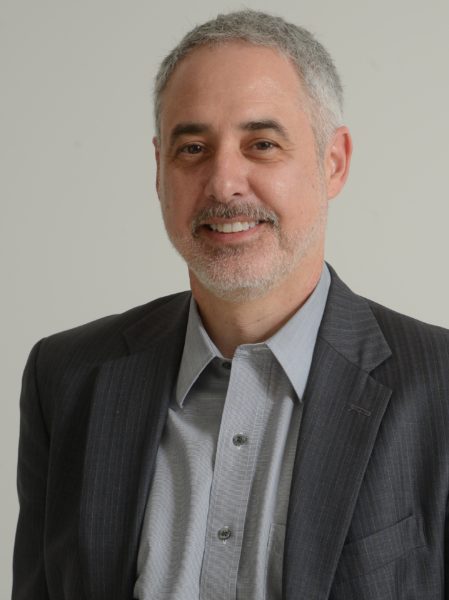
Since the Office of Information Technology’s inception, one of our significant strategic priorities has been to move toward an increasingly service-focused organization that anticipates, responds to and supports the dynamic needs of the university to help it fulfill its mission.
Closely aligned with this strategic priority is the creation of “One IT,” or the increased active collaboration and partnership among all university IT professionals to drive a focus on service.
A key effort in bringing these initiatives together this fiscal year is the revamp of IT governance, a structure the university will use to communicate, advise and decide on IT priorities and strategies.
This past year, a cross-functional team worked on the mechanics for a new simplified governance structure. This structure will be led by a new Strategic IT Committee (SITC) that will provide a university-wide IT vision, strategy and policy guidance. The committee will also consider and recommend IT needs and requirements that align with the university’s strategic plan.
Three subcommittees of the SITC will provide strategy and policy guidance in educational technology, enterprise applications and research, scholarship and creativity. Set to launch this fall, these committees will have internal and external stakeholders.
In addition to the work that is occurring with the IT Governance structure, we are continuing to extend our expertise and resources to advance the communities we serve.
- We have expended a great amount of effort to improve the university’s security posture, implementing many state and federal requirements, including the Payment Card Industry Data Security Standard (PCI DSS), the National Institute of Standards and Technology (NIST) standard and the Health Insurance Portability and Accountability Act (HIPAA); we’ve also supported faculty and organizations that are required to meet these security controls.
One of our key roles is to support university compliance while enabling and enhancing its activities, including the increasing cybersecurity demand for research grants and certifying training requirements. Last year, we generated a large number of successful cybersecurity projects, policies and outcomes. - We are moving to more common and interconnected platforms that allow all university partners to support their individual needs and focuses — ranging from REPORTER, the non-credit and training registration system, to the newly-renamed Research Enterprise Data (RED) System, which streamlines research activities on campus.
- We continue to expand our shared services approach to organizations that fit our mission, when doing so provides benefits to both parties.
- We are working with the College of Agriculture and Life Sciences to create a fiber internet connection at its research sites and developing strategies to leverage big data and further IT support for the Plant Sciences Initiative.
- We have partnered with NC State faculty, the Wireless Research Center of North Carolina, Mississippi State University, University of South Carolina and Purdue University on a proposal for a $24 million grant which if awarded we will support the newly organized Aerial Experimentation and Research Platform for Advanced Wireless (AERPAW) group to research opportunities combining wireless with unmanned aerial vehicles, or drones.
- We have also initiated a partnership with the North Carolina Department of Information Technology (NCDIT) as well as a novel partnership with Industry Expansion Solutions (IES) and area community colleges to develop cybersecurity professionals. Both efforts leverage our student internship program and tie into the concept of work-based education.
- We are working with the College of Agriculture and Life Sciences to create a fiber internet connection at its research sites and developing strategies to leverage big data and further IT support for the Plant Sciences Initiative.
These and many other critical activities, strategic priorities and partnerships are discussed further in this fiscal year’s Annual Report.
Future Endeavors
Our future will be determined, in large part, by how we adapt and take charge of its direction. I would like to see the campus IT community focus on supporting IT career paths and professional development opportunities that will help IT staff with employment growth options, education and career goals. This will enable the IT community to obtain career-relevant education to remain as critical university resources and to better understand and embrace the increasingly diverse human resources that are needed now and in the future.
In the coming years, my hope is that the entire IT community, as “One IT,” will continue to shift to a service-focus approach that will deliver IT strategies and solutions to help achieve the goals of our students, faculty (in teaching, grants and scholarships), staff, institutes, colleges, and our external partners.
Inside the 2018-19
OIT Annual Report
- About OIT
- OIT by the Numbers
- 2018-19 Highlights
- NC State Prague
- Partnership Spotlight
- Cooler Colocation!
- Room Check
- Strategic Goals
- Staff Achievement
Students make their way around campus. Photo by Roger Winstead
About
OIT
NC State’s Office of Information Technology (OIT) provides campus-wide computing, information and communication technology services in support of the university’s academic and administrative goals.
Our Mission
To provide nimble, effective, efficient, and collaborative IT services, solutions and strategies in a timely and helpful manner that assist the university, state and nation in achieving their strategic goals.
Our Vision
Be the IT organization that people seek out as a partner for providing visionary strategies, creative solutions, objective information, and effective and efficient services in order to help them achieve their mission and goals.
Our Units
OIT has a staff of 295 employees in seven units:
- Business Services
- Budget management, accounting, procurement, human resources, and asset management
- Communication Technologies
- Campus data network, infrastructure design and installation, data center management, file backup, firewalls, unified communications, telephone, campus operators, CATV, and video services
- Enterprise Application Services
- Advancement, Business Intelligence, Finance, Human Resources, Identity Management, MyPack Portal, Database Configuration and Management, Non-Credit, and Student Information Systems
- Outreach, Communications and Consulting
- Training, communications, IT accessibility, website design and development, mobile and application development, G Suite @ NC State, cable TV (PackTV) content, and media production
- Shared Services
- Virtual Computing Lab, High Performance Computing, research IT, middleware and application integration, storage, file services, directory services, and deployment of infrastructure and core services
- Security and Compliance
- IT operational security and support, IT security standards and procedures, risk and compliance, portfolio project management and organizational resilience, and software licensing management
- Technology Support Services
- Help Desk, Walk-in Center, ResNet, ClassTech, OIT Managed Desktop, ServiceNow, hosted services, student computing services, and desktop and end-user support
Our Budget
OIT’s budget for fiscal year 2018-19 was $62 million, with personnel accounting for 55 percent and operating cost accounting for 45 percent. OIT received $3.4 million in one-time funds for enterprise storage, cybersecurity, Data Center 1 relocation, building rewires, network replacements, software license/maintenance and server infrastructure refresh.
OIT by the Numbers
Research

High Performance Computing (HPC) Cluster supported:
- 539 faculty and students
- 163 research projects
- 18 courses
- 4.3 million jobs that used more than 40 million processor hours of computation
Virtual Computing Lab supported:
- 8,535 unique users
- 110,677 reservations
- 1.95 million reservation hours
Student Success
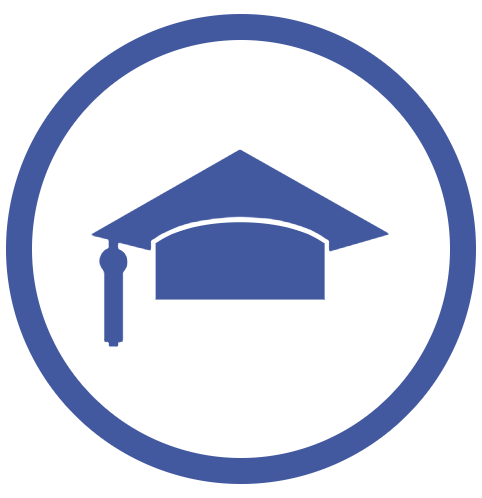
- 151,649 unique devices connected to the wireless network.
- 161,000 optical mark exams scanned.
- 350 student-produced sports programs created for PackTV.
- 94 million files shared for collaboration on Google Drive in the last year. 75 million of these were shared privately among individual account holders inside or outside our domain.
- 2.05 million pages printed in the WolfPrint accounted printing service.
- 7,518 new copies of the OnCampus mobile app downloaded.
- 2,840 WordPress blog sites.
- 6,000+ applications for admission processed, resulting in 11,000 enrollments; about 850,000 credit hours and academic progress managed for 38,000 students in over 21,000 classes; and 9,900 degrees awarded.
- 1,843 teaching licenses processed.
Collaboration

- ~59% of the 700 IT-related positions on campus were external to OIT.
- $18 million of the software licensing on campus is managed by OIT’s Software Licensing Management team; $1.3 million of which is managed partnerships with colleges and departments.
- 282 spaces supported by ClassTech. These spaces include 161 of the 226 110 classrooms. All 110 classrooms have technology.
- 23,000 Windows devices managed via the jointly-maintained Active Directory service.
- 66 units at 11 UNC schools used the federated Jamf Pro Apple device management suite that is co-managed by NC State OIT staff.
- 73,730 Google Hangout video conferences held in 2018-19.
- 60+ departments, centers or other unit sites are using the hosted WordPress environment.
- 4 UNC sister campuses rely on OIT support for voice and call center services.
- 63 clients supported for video production services
Organizational Effectiveness

- 99.993% network backbone uptime.
- 220 new clickwrap agreements reviewed.
- 42,646 wired outlets and 88,082 network ports.
- 7,386 wireless access points.
- 15,386 phone lines.
- 37,521 campus operator calls received.
- 50,000+ software downloads.
- 315 training sessions conducted, serving 2,601 enrollees (excludes custom classes).
- 2,600 phone calls per month received by the Help Desk Call Center, resolving more than 45,000 incidents over the past year.
- 186,000+ ServiceNow incidents logged from over 267 assignment groups throughout campus.
- 1.95 million unique pageviews on the OIT multisite network sites.
- 60 Web Design Services contracts with 37 unique departments.
- 44,016 active shortened links through the Go Links service.
- 3,475 software licensing support tickets resolved.
- 117 eStores managed involving 40,000 transactions and over $9 million in revenue.
- 75,000 registrations and 3,900 class sections managed in REPORTER involving $2.7 million in course payments and fees and more than 3,500 external customers.
- 9,000 reservations across 30 labs in four facilities managed via the new Lab Management System, resulting in over $2.6 million in revenue.
- 993,000+ documents (2,000,000+ pages) managed within the OnBase Document Management System.
- 116,000 vendor payments (including employee reimbursements), 44,000 student refunds and $312 million in purchases of goods/services processed for total payments of $600 million.
- $34 million of non-student billing managed.
- $900 million in payroll costs managed across 7,500 funding sources for 26,000 employees resulting in 1.4 million payments; 5.8 million time punches for approximately 20,000 employees processed.
- 24,000 hire/rehire actions and 50,000 benefit enrollments processed; 26,000 W-2s generated.
- 4,200+ enterprise application migrations
- 120 managed databases
Security

- 1,774 campus users assisted after their accounts were compromised.
- 408 applications requested for InCommon Certificates, which validate the security of websites.
- 18,433 ServiceNow tickets requested Security and Compliance assistance in support of security services including scanning, Tripwire and Splunk.
- 166 third-party vendor assessment reviews associated with the IT Purchase Compliance process with average time of 20.3 days to close tickets. About 19.3 percent required security reviews and 63.3 percent required accessibility reviews.
- 600+ assets out of 8,500 total assets in Nexpose are scanned for vulnerabilities on a regular basis.
- 291,000+ electronic identities were managed for students, employees and guest/affiliates; 21,000+ privileged accounts added each year.
- 6,000+ authorization requests and updates for enterprise systems processed using the Security Access Request (SAR) system
- 5,300 password update requests processed monthly for 188,300 active accounts.
- 662,000 role/access group assignments managed
- 8,783 new employees enforced in 2FA
2018-19
Highlights
Developing technological and academic networks in Prague
Dan Evans stands in front of the Statue of Franz Kafka that is inspired by the surrealist writer’s 1912 story, “Description of a Struggle.” Photo by Pete Evans
Nicknamed the “City of a Hundred Spires,” Prague is home to well-known cultural attractions, including its numerous Gothic churches, the Prague Castle, the Astronomical Clock and the Old Town Square, its center of history and tourism.
More than 4,400 miles away, the capital of the Czech Republic is also home to the NC State European Center in Prague (NC State Prague for short), where students flock to study abroad to experience Prague’s rich culture and beautiful Baroque and Gothic architecture.
Approximately 100 university students, the largest class ever, attended NC State Prague this summer.
Prior to their arrival, the Office of Information Technology (OIT) and the Office of Global Engagement joined forces to ensure these students had the same computing experience as they did on NC State’s campus.
Endpoint Protection Standard
Early this year, the Office of Global Engagement sought OIT’s assistance to help the center meet the new Endpoint Protection Standard (EPS) requirements. The EPS outlines the minimum requirements, or security controls, for information system components that connect to NC State’s network. It also applies to users of personally owned and university-owned resources and devices that connect to the network.
“Their machines were aging out,” said Dan Evans, information technology manager in OIT Technology Support Services (TSS). “And they needed to be standardized, modernized and comply with the new Endpoint Protection Standard by June 30.”
First Site Visit
Prague Institute is located in Ericsson Palace, a medieval-century building located off the Small Square. Photo by Anaël Symůnková
In mid-February, Dan Evans and Danny Davis, director of TSS Client Solutions, travelled to Prague to set up internal IT support services, to assess the center’s computing environment and to make recommendations.
On their first day, they toured the facility with Kim Strozewski, the entering program director. NC State Prague occupies three floors of Ericsson Palace, a medieval-century building located off the Small Square. They also met with Heidi Hobbs, the exiting program director, and Strozewski to talk about the program and student needs.
Evans said one of their initial steps was to transition the center’s IT support services from a local company. The team met with the company’s staff to obtain information about the configuration of the center’s computing environment to acquire and lockdown server and system credentials. They also interviewed students and staff to learn about their technology use and existing technologies in the classroom.
According to Evans, the team knew that the center’s existing computing environment did not meet the EPS requirements and was in need of updates. It consisted mostly of aging and out-of-warranty stand-alone machines that were not connected to or managed by the university’s systems in Raleigh. There was a virtual private network (VPN) tunnel between Prague and the NC State network, but it was not configured properly to allow a seamless use of U.S. campus resources. There was also a student lab environment that shared a common login, creating a security issue if students did not log out of their personal web-accessed accounts.
These and a number of other hardware and networking issues were cited during this visit and immediate, and mid- and long-range range goals were developed to address these issues.
“We needed to standardize the experience for students, faculty and staff there,” Evans said. “We needed to make the lab look like a lab on campus and make the user experience look like that of the Raleigh campus.”
To move in that direction, they worked with Dell representatives in the U.S. and the Czech Republic to purchase and deliver 25 new computers and monitors and purchased additional items locally. The first round of hardware refresh cost about $30,000 and was just the beginning of the work that was ahead.
The team also recommended that the center hire staff to provide hands-on IT support for the students and staff. The part-time position reports to OIT’s managed desktop manager to ensure the center’s operations follow standard processes and procedures.
Return Visit
Evans and Peyton Armstrong, technology support specialist in TSS, returned to Prague in late April to welcome Tomer Mataraso, the newly-hired local support technician. They began the hardware refresh and to rebuild the center’s network. Among their tasks, they:
- Re-imaged the newly purchased machines with OIT Managed Desktop’s standard software.
- Set internet protocol (IP) address ranges for the campus.
- With Comtech’s assistance, replaced the VPN hardware and rebuilt the VPN tunnel.
- Reassigned the IP addresses for the network infrastructure to set up eduroam.
- Reassigned the IP addresses for the printers.
- Copied the center’s data to a Google Shared Drive.
“As much as we could, we transitioned them into the OIT Managed Desktop environment,” Evans said.
“Standardizing and incorporating NC State Prague as an extension of the Raleigh campus allows the computing experience of students, faculty and staff to be seamless when moving and operating between locations,” he added.
According to Evans, the center now has a more robust, secure computing environment that can be managed remotely from NC State. OIT will continue to work with the center to determine a long-range plan for its technology needs, which will include an annual assessment for computer and equipment refreshes.

Partnership Spotlight

Preparing CALS research farms and fields for the future
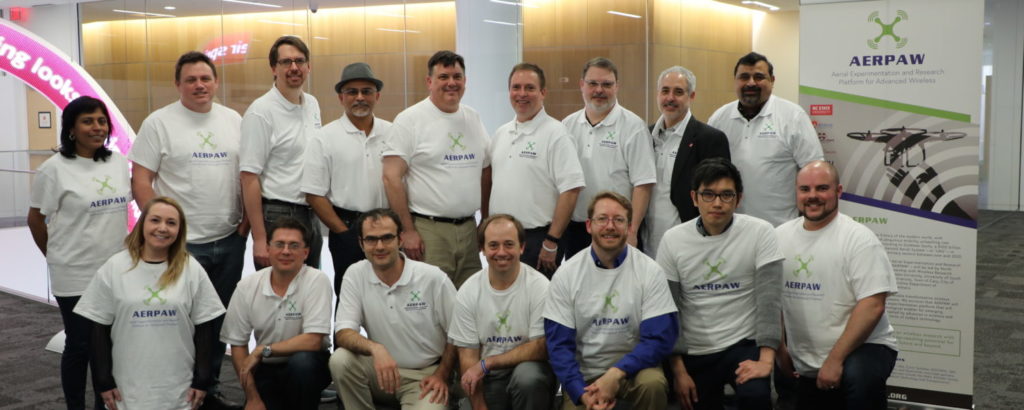
Proposal to study wireless with drones

Day of Giving
Cooler Colocation!
Amy Tawes, Dan Griggs, center, and Harry Nicholos, all of OIT, discuss project plans for the Data Center 1 relocation. Photo by Stan North Martin
NC State University is partnering with the North Carolina Department of Information Technology (DIT) to lease data center facilities — a collaboration that allows the university to save significantly on costs, while keeping options open for cost-effective cloud technologies.
The Office of Information Technology (OIT) is in the process of relocating hardware from the university’s aging Data Center 1 (DC1) to DIT’s Eastern Data Center (EDC) by December 2019. NC State is the first institution of higher education to host data services at EDC, which serves a number of state agencies.
The new partnership allows the university to rent sufficient space, cooling and power to host and operate university-owned equipment in a modern data center environment that meets long-term university needs. NC State will also have the flexibility to reduce space in EDC if cloud solutions are more cost effective — an option that would be lost if costly capital investments were made on campus.
A recent data center study concluded that the colocation facility was the most cost-effective option in comparison to building a new primary data center estimated at $60 million or updating DC1 with the necessary power and cooling infrastructure.
The process to relocate DC1 hardware to EDC is currently underway. The project is being sponsored by the virtual chief technology officer (vCTO) team, which includes Greg Sparks of OIT Communication Technologies and Eric Sills of OIT Shared Services. The 14-member project team has broad representation from multiple units within OIT.

Protect Your Assets!
Room Check
NC State Department of Electrical and Computer Engineering senior design students demo the room check kit.
On a daily basis, ClassTech manages and services over 150 high-tech classrooms. Staffers operate much like a pit crew, efficiently running diagnostic tests and quickly fixing technology issues between class changes.
But with the demand for projectors and speakers in classrooms and a subsequent increase in the number of high-tech classrooms to support, the question becomes how to support them all with limited staff?
ClassTech head Ron Bradley and his team have been thinking about ways to improve room check efficiency for the past few years.
“We are a technology university and we are the centralized IT group, so we have to find ways to incorporate the technology the students and faculty expect us to have in classrooms,” Bradley explained. “You have to be able to support it and we can’t do that with just more staff. Plus we wanted to do something cool. We’ve got some really bright students that work for us.”
The Cool Factor
Bradley teamed up with Rachana Gupta, Ph.D., teaching associate professor and associate director of the electrical and computer engineering (ECE) senior design program, to bring in students to help to develop a room check solution. Under Bradley’s supervision, the team is developing a kit containing a camera, microphone and Raspberry Pi microcomputer to remotely run technology performance tests in classrooms after hours. In its initial testing, the kit alerted ClassTech staffers if a projector failed to display an image or speakers emitted an unusual frequency.
Bradley is now working with students to design a portal that controls the microphones, cameras and microcomputers in the kit. The goal is for staffers to use the portal to initiate remote tests on classroom technology.
Bradley hopes that in the near future the kit will automate the room check without interfering with class times and catch up to 75 percent of the most common problems ClassTech staff encounter during their on-site checks. While the roomcheck kit is projected to take three years to complete, Bradley says the project is a worthwhile investment of time, freeing up ClassTech staff to service additional 110 classrooms and to work on other projects.
While the partnership has helped to develop the room check tool kit, it has also helped students gain work experience. Gupta explains, much like in industry, students must learn skills “on the go” while navigating a variety of tools to make the project work.
“A good project is both challenging and also feasible for the students to work on and where the mentor or sponsor is really involved in it and has a stake in it,” Gupta said. “They want to work with students so it makes a good team. And in Ron’s case, all that is true.”

100% PCI DSS Compliant
University Strategic Goals
- Enhance the Success of Our Students Through Educational Innovation
- Enhance Scholarship and Research by Investing in Faculty and Infrastructure
- Enhance Interdisciplinary Scholarship to Address the Grand Challenges of Society
- Enhance Organizational Excellence by Creating a Culture of Constant Improvement
- Enhance Local and Global Engagement Through Focused Strategic Partnerships
OIT supports the goals of “The Pathway to the Future: NC State’s 2011-2020 Strategic Plan” through the following services.
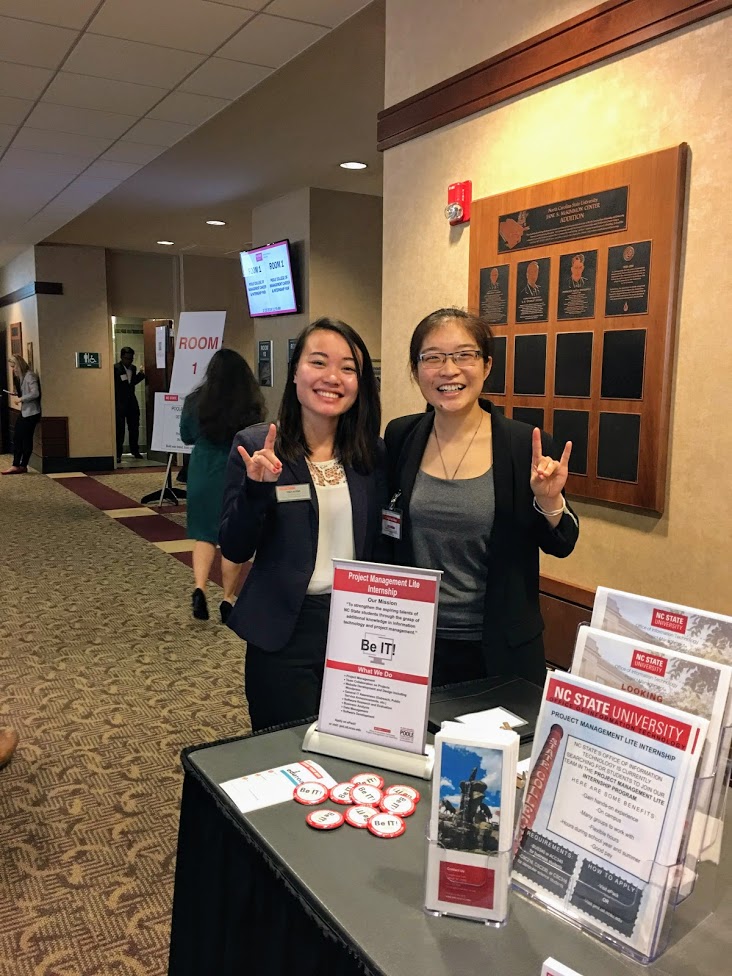
Thuy Huynh and Lingchao Mao of OIT’s Project Management Light Program participate in the spring Poole College of Management Career Fair.
GOAL 1: ENHANCE THE SUCCESS OF OUR STUDENTS THROUGH EDUCATIONAL INNOVATION
- Enhanced functionality within the Student Information System (SIS). Created an online system for effectively managing the Provost’s Professional Experience Program or PEP. Modified SIS to provide access — including access to Pack Planner and Degree Audit — to students attending area community colleges in the new Community College Collaboration program. Developed a system for tracking and documenting NCAA eligibility for student athletes. Automated posting of transfer credit to improve advising for new transfer students. Created a custom application with workflow to academic departments for evaluation of external courses for student transfer credit. Adding classroom building mapping to student class schedules and the Enrollment Wizard.
- Completed the implementation of Slate, a customer relationship management platform that facilitates more advanced prospecting and recruiting, for the 2018-19 graduate and non-degree admissions cycle and the bulk of the work necessary for the 2019-20 undergraduate admissions cycle.
- Continued to grow the Project Management Lite (PML) internship program. There are 36 students currently participating in the program from the NC State Poole College of Management, the Department of Computer Science and the Department of English. The program was expanded to include collaboration with the North Carolina Department of Information Technology (DIT) and with the NC State Industry Expansion Solutions (IES) – North Carolina Manufacturing Extension Partnership (NCMEP) and Fayetteville Technical Community College for cybersecurity training. It provides students an opportunity to work on projects with experienced professionals and helps them build their strengths and increase their talents and knowledge. This year’s interns promoted two-factor authentication efforts via the IT Club, Cybersecurity Awareness Month, Campus Connections and two-factor authentication (2FA) workshopsk. The interns helped to inform the campus community about green IT practices.
- Provided dozens of student staff, in addition to the PML program, with valuable on-the-job training in multiple areas, including programming, cybersecurity, web development, multimedia journalism and video production, network operations, and computer diagnostics and repair.
- Continued to promote the teaching college/internship model by partnering with university interns and graduate students on OIT Security and Compliance projects. Student interns helped to write security articles and assisted with routine tasks. Several students developed a threat notification portal as a project for their Business Management 440 Database Management course, while another student used his work in Software Licensing as his practicum, producing several software installation tutorials, including for SAS.
- Partnered with faculty in Parks, Recreation and Tourism to provide real-world sports journalism experience to students for PackTV.
- Upgraded the network bandwidth of ResNet, the university’s residential network, from 10 Gbs to 20 Gbs.
- Expanded the successful Accessibility in the Classroom online training for faculty, with half of the more than 340 participants coming from universities outside of NC State.
- Provided more than 50,000 licensed software activations and downloads of the more popular applications for the campus community.
- Continued to investigate a pilot and an enrollment plan for implementing 2FA for the student population.
GOAL 2: ENHANCE SCHOLARSHIP AND RESEARCH BY INVESTING IN FACULTY AND INFRASTRUCTURE
- Partnered with the Office of Research and Innovation (ORI) to implement the first module of NC State’s new Research Enterprise Data System or RED, the Animal Care and Use module. This moved a paper document process to an online, workflow-driven application to manage more than 300 protocols annually.
- Partnered with the College of Agriculture and Life Sciences (CALS) in planning significant infrastructure upgrades for research farms, including producing a master plan for networking at the Lake Wheeler Road Facility and preliminary designs for IT enhancements at the Central Crops Research Station.
- Partnered with NC State’s Department of Computer Science, along with Duke University and the University of North Carolina at Chapel Hill, to support the Breakable Experimental Network or BEN, “a regional optical network test bed for experiments with disruptive networking technologies.”
- Architected and began the implementation of the Security, Network, and Research Environment (SNARE), which is designed to segregate certain research traffic from the production network. SNARE is used by university cybersecurity research teams.
- Completed implementation of the Lab Management System in all five Shared Core Research Facilities. More than 50 labs are now using the system to manage 25,000 reservations that brought in $2.5 million.
- Continued support, maintenance and expansion of the Secure University Research Environment (SURE) for sensitive research contracts or grants that require NIST 800-171 compliance and Defense Federal Acquisition Regulation Supplement (DFARS) clause. Continued collaboration with the ORI to complete the Plans of Action and Mitigation documentation to achieve 100% compliance.

NC State farms located off Lake Wheeler Road. Photo by Roger Winstead
GOAL 3: ENHANCE INTERDISCIPLINARY SCHOLARSHIP TO ADDRESS THE GRAND CHALLENGES OF SOCIETY
- Continued to work with CALS and partners to develop strategies to leverage big data and further IT support for the Plant Sciences Initiative.
- Partnered with ORI to form teams for cyber grants. Provided project management and guidance for the $10 million grant proposal to serve as one of the locations to develop new Platforms for Advanced Wireless Research. Began providing project management coordination for a $70 million grant proposal to develop a large-scale semiconductor manufacturing facility.
GOAL 4: ENHANCE ORGANIZATIONAL EXCELLENCE BY CREATING A CULTURE OF CONSTANT IMPROVEMENT
- Implemented the new Exadata database server architecture to facilitate the retirement of Solaris servers, migrated all OIT Oracle Enterprise databases to the Exadata and upgraded them to Oracle 12c on Real Application Clusters (RAC).
- Upgraded the network wiring infrastructure in nine buildings, including three houses in Greek Village and CMAST in Morehead City.
- Updated the Data Removal Procedures, in collaboration with Materials Management, to include additional requirements ensuring that data has been removed and they are able to be successfully re-purposed or sold through University Surplus.
- Completed a review of the existing Data Sensitivity Framework (DSF) and supporting policies, regulations and rules for the purpose of validation and required updates. Began sharing the results of the DSF review and receiving feedback from campus partners. Also updated and enhanced the current university DSF training to increase campus awareness on data classification, threats to digital assets, and methods to defend against threats. Completed the training for the remaining 100 employees with access to ultra-sensitive data.
- Expanded the use of REPORTER for internal training and implemented a Minors Portal for parents and youth registrants and Minor Offering registrations.
- Implemented the statewide Residence Determination Service tuition residency system for graduate and veterinary medicine students.
- Partnered with University Advancement to provide technical support and gift processing for the university’s first Day of Giving Campaign. This campaign resulted in 10,810 gifts and more than $13.5 million in donations.
- Partnered with Contracts and Grants to create a Grants Office Dashboard to more efficiently and effectively surface grant-related financial system transactions for management and processing.
- Partnered with Human Resources (HR), Registration and Records, and University Advancement to expand the OnBase Document and Content Management System, implement secure access controls, eliminate physical file storage space, reduce duplication, and increase the sharing of documents in the following areas:
- Employee records management for nine colleges and departments
- Student services document management for three colleges
- Foundation document management for one foundation
- Implemented new OnBase document and content management for Environmental Health & Public Safety, University Payroll and Study Abroad to automate business processes, provide secure storage and management, and adhere to state and federal regulations.
- Implemented new weekly time summary views for WolfTime in the HR System.
- Applied two separate iterations of major application maintenance to the HR System.
- Redesigned and upgraded the Oracle Identity Management (OIM) infrastructure from 11g to 12c, implemented enhancements to the Self Service Password Management application and integrated OIM with ServiceNow.
- Extended use of the SAS Visual Analytics platform by deploying new versions of the Admission Status Reports and creating new enrollment forecasting reports and Factbook visualizations. Onboarded new groups to the platform and extended the data mart to support additional academic and business operations groups including the College of Textiles, HR, the REPORTER non-credit registration, and the Provost Office.
- Participated in the SHRA to EHRA transition. Karen Horne, Gwen Hazlehurst and Susan West are members of the campus planning team, and many OIT managers served as subject matter experts to evaluate the position description questionnaires.
- Deployed new hyperconverged infrastructure (HCI) at the North Carolina Department of Information Technology (DIT) Eastern Data Center (EDC) in preparation for the relocation of Data Center 1 (DC1). This aligns with the strategic direction away from large fiber channel fabrics. The EDC HCI infrastructure will replace the deployment and general virtual machine (VM) farms from DC1.
- Upgraded to ServiceNow’s London release in December 2018. Launched several strategic initiatives to improve IT Service Management processes: Service Portfolio to develop an inventory of OIT projects and processes for maintaining the portfolio; Incident Management and major incident management; Knowledge Management; Configuration Management and the development of a Configuration Management Database; and IT Service Portal. Work will continue on these projects in the next fiscal year, and additional projects will be added, including a Change Management improvement initiative and a Governance, Risk Management and Compliance module. These processes will be supported by the ServiceNow platform.
- Converted University Housing application to new StarRez system.
- Began project to replace SysNews with modern platform, replacing some custom applications and cleaning up others that are no longer functional.
- Retired the www4.ncsu.edu service that was used as personal web space, encouraging use of the many other avenues to publish content to the web.
- Improved performance and maintenance of the tuition calculation process.
- Continued expansion and implementation of security tools to improve protection of university information systems and data: vulnerability scanning, web application scanning, file integrity monitoring, sensitive information discovery, logging and monitoring, security information and event management, a network intrusion detection and protection system, a PCI inventory application, and two-factor authentication.
- Performed a HIPAA risk assessment of NC State’s covered entities: Counseling Center, Student Health Services, Sports Medicine, Psychoeducational Clinic, and Diagnostic Teaching Clinic. Risks were identified and a project team including both business and technical stakeholders was formed to work through the remediation.
- Performed the Gramm–Leach–Bliley Act (GLBA) risk assessment for Financial Aid to make sure its operations are in compliance. Also began a risk assessment of the Cashier’s Office to ensure compliance.
- Upgraded network electronics in 50 buildings on campus.
- Completed the project that provided ubiquitous Wi-Fi in all 110 Classrooms.
- Completed a major upgrade of wireless network infrastructure.
- Completed a major hardware upgrade to the virtual private network infrastructure.
- Completed a resilient fiber path to avoid potential disruptions to West Campus locations during the beltline widening project.
- Continuing work toward elimination of campus email relays. Moved bulk email from REPORTER and DELTA to SendGrid with PeopleSoft applications transitioning soon.
- Deployed new eSFTP service and worked to transition clients to new service. In many cases, a more secure protocol was used after the transition. The new service architecture allows future client moves from ftp to sftp to be handled more easily.
- Transitioned OIT Linux build environment from Puppet Enterprise to current version of open source Puppet. This environment is used for the Payment Card Industry Data Security Standard (PCI DSS)-connected systems and most OIT Linux servers.
- Began providing www.ncsu.edu and cdn.ncsu.edu cached web pages that are accessed from off-campus via Amazon CloudFront.
- Set up Bank of America as a trading partner to allow direct payments to vendors who are bank customers.
- Completed successful proof of concept of Shibboleth authentication using cloud-based servers: Shibboleth Identity Provider at Amazon Web Services and Microsoft Azure-based Active Directory Domain Controller.
- Created .secure G Suite, a tightly controlled area within the ncsu.edu Google domain to address requirements for the National Institute of Standards and Technology (NIST) 800-171 compliant collaboration environment. The impetus was for the Lab for Analytic Sciences, however, the solution is scalable for other groups that require this level of security controls.
- Continued migration from Andrew File System to AuriStor that will result in a simpler file system structure that will enable future changes and improvements.
- Moved to new VMware licensing model that charged for actual use instead of licensing a specific number of sockets.
- Replaced antivirus on servers to comply with a federal directive.
- Upgraded Oracle Identity Management infrastructure with all new VMs, using architecture recommended and reviewed by Oracle.
- Completed an initial evaluation to use Azure for Virtual Computing Lab Windows image deployment to potentially avoid ongoing and rapidly increasing virtual desktop application license cost for student-owned computers to access university-owned Windows desktops.
- Cleared final contract hurdles to improve Verizon cell signal with the first six buildings currently being implemented.
- Supported Athletics by leading project to install fiber optics to every NC State sports venue in support of the upcoming ACC Network.
- Deployed software to improve remote desktop support capabilities and workstation management for OIT managed desktops.
- Closed the Unity lab in the D. H. Hill Jr. Library permanently in May 2019. Reorganizing the Unity lab in Sullivan Hall during summer 2019 to accommodate a new Maker Space.
- Worked to integrate Amazon Web Services into Hosted Services group offerings to campus customers. The expertise in this area benefits Hosted Services clients as well as researchers who will use SURE.
- Developed PCI Operational Standards for On-Boarding documentation for Hosted Services. This information will be moved to the ServiceNow KnowledgeBase.
- Reconfigured Walk-in Center’s (WIC) space in summer 2018 to increase its walk-up support capacity to handle 2FA incidents. The WIC has seen an increase in 2FA support requests, including those for mobile device support. Also 25% of the incidents handled by the Help Desk are related to 2FA.
- Responded to the biggest change in the WordPress content management system in 15 years with the rapid development of NC State Blocks, a new plugin for campus to facilitate branded and accessible content in the recently-released WordPress Blocks Editor.
- Contributed back to the WordPress Core Development of Blocks Glossary plugin for assistance working and developing with blocks.
- Transitioned all sites and environments to WordPress 5.0 in conjunction with the new Classic Editor or configuration and support of the new block-based editor.
- Redeveloped the Go Links link shortening service using a modern web framework and adding new functionality, including improved analytics and integration with Google Groups.
- Piloting G Suite for Education Enterprise that provides a set of tools to manage NC State’s entire Google environment. Features include advanced controls, enhanced analytics and search, and enterprise-grade communication tools.
- Increased the security of Google generic account passwords by updating the entropy requirements in response to an audit finding.
- Working to consolidate email gateways, leveraging Google’s service and introducing a third-party service for large-volume outgoing mail.
- Relaunched the “Accessibility Excursion” on campus to raise awareness about campus accessibility and to address accessibility barriers. OIT’s accessibility coordinator led the effort and partnered with Student Government, Office of Institutional Equity and Diversity, Disability Resource Office, Facilities Division, Campus Wellness and Recreation, and University Housing.
- Enhanced the OIT Portfolio tool to track and manage portfolio and Cybersecurity Roadmap projects. There are currently 51 active major projects.
- Assisted more than 1,774 account holders from further compromise, an increase of more than 450 from last year.
- Processed more than 18,433 ServiceNow tickets in support of security services, including vulnerability scanning, file integrity monitoring, and general logging/monitoring — a dramatic increase from 12,237 last year.
- Received 408 new applications for InCommon certificates compared to 993 last year. Maintaining 2,658 active certificates.
- Resolved 2,811 OIT Managed Desktop service and support incidents for supported units, which is an increase of 292 tickets over the last fiscal year.
- Conducted 6,602 Technology Room Checks this past cycle. This resulted in ClassTech discovering, and resolving 487 issues before they impacted courses, faculty or students.
- Managed 98 ClassTech projects this year, which is up 5% from last year. Thirty-four of these projects were internal to ClassTech, including upgrades to existing ClassTech spaces. Sixty-four projects were for external clients seeking ClassTech expertise and it is estimated that the university saved about $81,500 on project management costs. Major projects included the Carmichael Gym Renovation, Fitts-Woolard Hall, Rooms 103 and 117 in Poe Hall, and Room 1216 in SAS Hall.
- Resolved a minimum of 3,475 software licensing support tickets.
- Negotiated new enterprise license agreements with Microsoft, VMware and Mathworks (MATLAB).
- Negotiated with Adobe and campus to establish a new Adobe Enterprise Agreement that will save campus approximately $245,000.
- Managed group software and licensing and maintenance contracts totaling $18.9 million in addition to the $1 million SAS grant. Managed licensing partnerships with colleges and departments totaling $1.37 million.
- Terminated phased-out software, saving the university $521,000.
- Reviewed 220 additional clickwrap agreements for risks. Reviewed a total of 1,071 since inception.
- Continued to enhance the IT Purchase Compliance Review process to review IT purchases over $5,000 for security and accessibility compliance. In the past year, conducted 166 reviews. Of the 166 submissions, 19 percent required security reviews and 63 percent required accessibility reviews. The process is reviewed continuously for development and improvement to accommodate anticipated growth in demand.
- Updated and prioritized the NC State Cybersecurity Strategic Plan (three-year Roadmap) with targeted activities and resource requirements for securing university information systems and data to meet university-wide compliance with rules, regulations, laws and contractual obligations.
- Expanded the Cybersecurity Awareness Team (CSAT) to include representatives from various campus departments. Charged with educating campus users on cybersecurity-related issues and providing cybersecurity resources and programming, the team implemented several major initiatives this fiscal year, including: Cybersecurity Awareness Month events, Data Privacy Month events and the deployment of the university’s first Data Security Training module.
- Released new PackTV, NC State TV and Wolfbytes TV apps on the Apple TV and Roku platforms, with 8,000 new installs in the past year.
- Sponsored the 2018 Cybersecurity Awareness Month event, “Protect the Pack: SecureU,” which was a series of conversations with leading security experts on the latest cybersecurity trends and threats, effective security measurements and the hottest careers in cyberland. SecureU featured the Decode Cybersecurity: Triangle Tech Panel, iOS Mobile Device Security presentation, Android Mobile Device Security presentation, and RTP180+NC State: Fake News lightning talks.
- Sponsored the 2019 Data Privacy Month (DPM) event, Protect the Pack: Cover Your Assets!” to empower campus users with the tools and knowledge necessary to protect their privacy and control their digital footprint. During Data Privacy Month, OIT launched its first employee-wide Data Security Training and hosted a mobile device security presentation and several checkpoints.
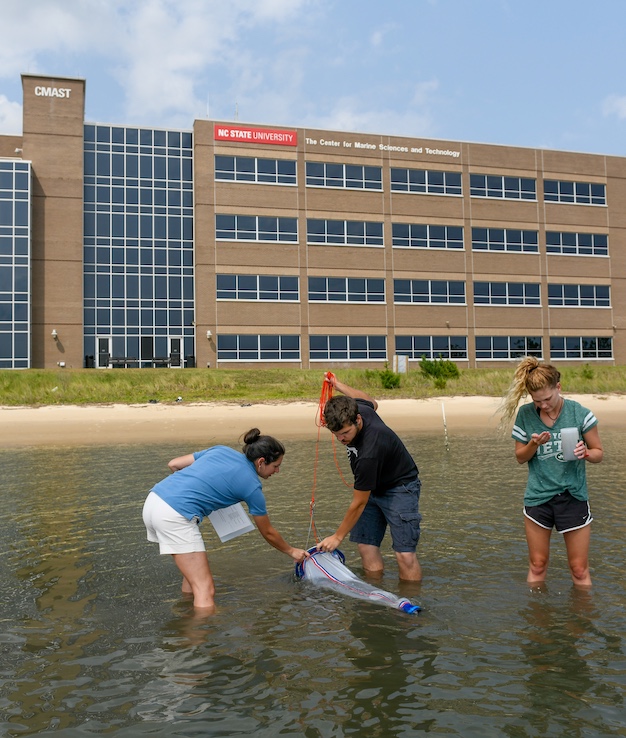
A teaching assistant and students collect water samples in the Bogue Sound near the Center for Marine Sciences and Technology facility (CMAST) in Morehead City, N.C. Photo by Marc Hall
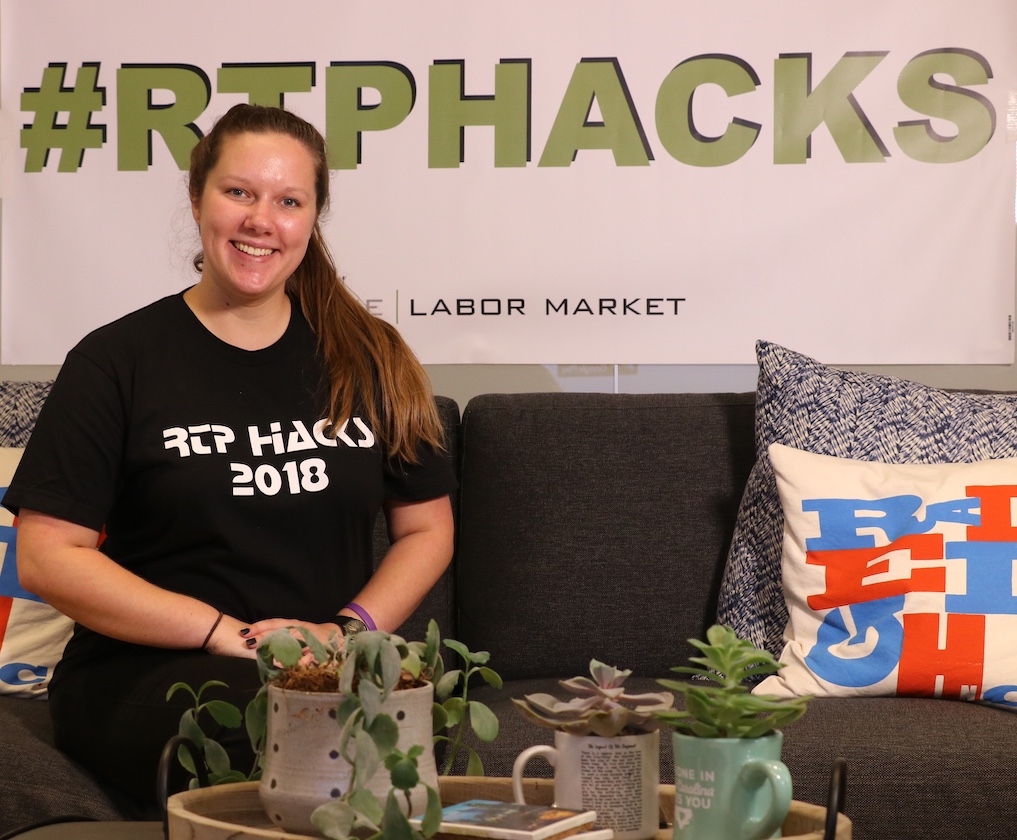
Mia Freeland and Stevie Thompson (not shown) of OIT’s PML internship program participated in the RTP Hacks 2018: Southeast Raleigh hackathon, which showcased the high-tech workforce of the future. Photo by Stevie Thompson
GOAL 5: ENHANCE LOCAL AND GLOBAL ENGAGEMENT THROUGH FOCUSED STRATEGIC PARTNERSHIPS
- Established a partnership with IES-NCMEP for Security and Compliance to provide subject matter expertise, assessment services, and support in the area of cybersecurity, specifically as it aligns to the NIST 800-171 standards. The partnership provides training for students at both community colleges and NC State, enabling them to provide these services. Members of OIT Security and Compliance serve as the subject matter experts and assessment resources for NCMEP in the delivery of the assessment tools developed for the NIST MEP Network Digital Supply Chain Project.
- Continued to work with North Carolina DIT to leverage shared data center services.
- Championed the WPCampus Gutenberg Accessibility Audit, which details usability testing to create accessible content with the WordPress editor, used by about 30 percent of all of the world’s websites. OIT Design & Web Services, along with the IT Accessibility Office, provided recommendations for the editor’s use and adoption on campus.
- Served in various security organizations to share current security threats and resources. Current memberships include: the Multi-State Information Sharing & Analysis Center, the Research Education Network Information Sharing & Analysis Center, the ISACA, the FBI’s InfraGard, the Information Systems Security Association, the International Information System Security Certification Consortium (ISC)2, and the FBI Red Dart/NCMS.
- Assisted with the planning and development of “RTP Hacks 2018: Southeast Raleigh hackathon,” an interactive experience for students ages 13 to 17 to explore careers in technology. PML interns Mia Freeland and Stevie Thompson helped to design activities and lessons on HTML for the hackathon’s “Intro to Technology” virtual course, created a pre-course survey, enrolled students into the course, and assisted with the course kickoff programming. In addition, they created a registration system for the hackathon event and served as program ambassadors.
- Began launching the Science Olympiad event in collaboration with the American Society of Civil Engineers, Lenovo and Experimental.
- Presented (ISC)2 Safe & Secure Online curriculum to more than 300 elementary and middle school students and parents in the Wake County School System.
- Participated in Wake Forest’s first STEM community event emphasizing cybersecurity and technology careers to local youth with a focus on involving girls in the field.
- Served on the Apex High School Academy of Information Technology (AOIT) STEM training public-private partnership program.
- Participated on the team that plans and facilitates the North Carolina InfraGard Cybercamp, a week-long camp that offers an opportunity for 30 STEM-focused high school students to identify their future career path in science, technology, engineering, math, and cybersecurity.
- Continued involvement with Southeastern Universities Research Association, the University of North Carolina System and other educational IT organizations to improve higher education IT partnerships.
Staff Achievement
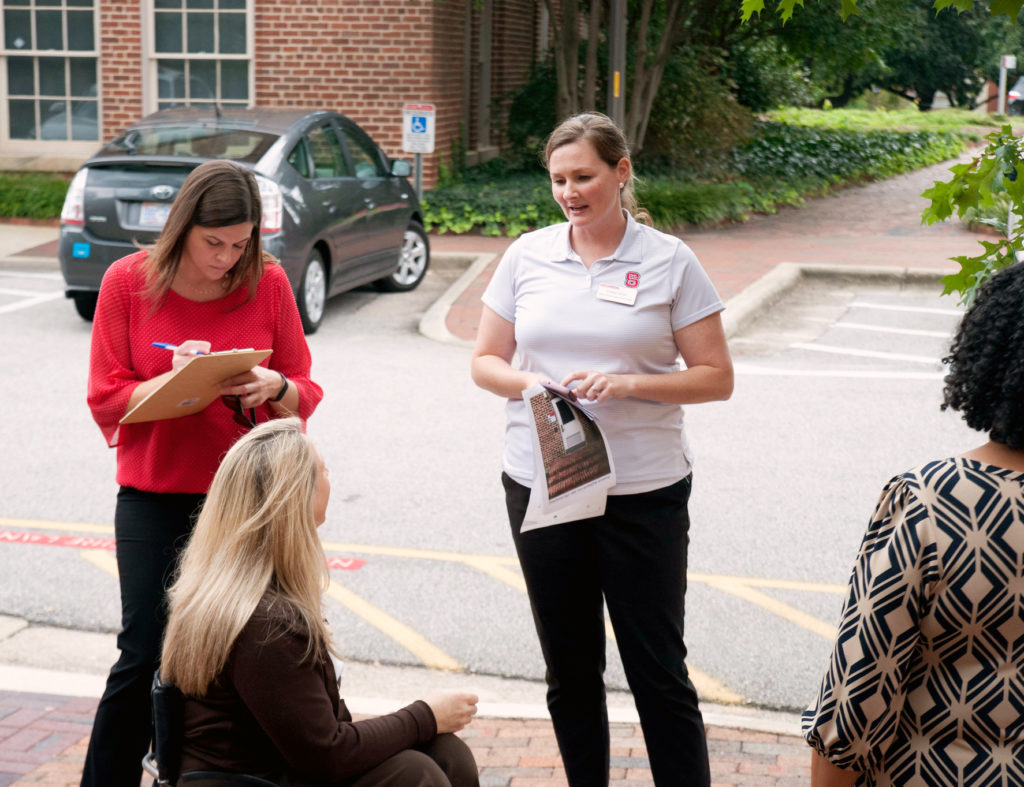
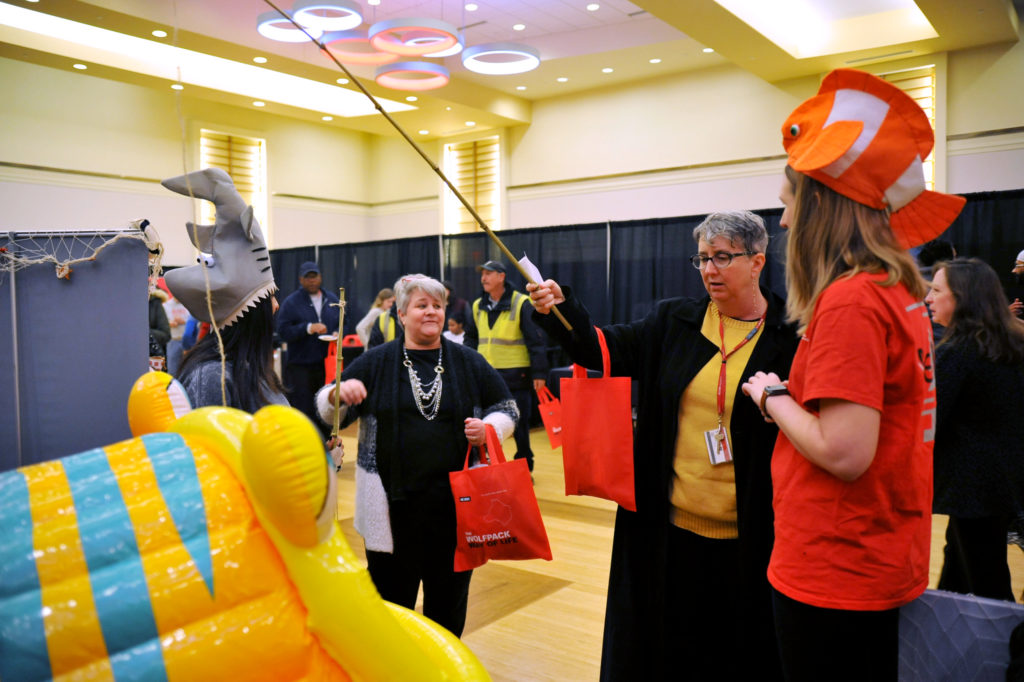

.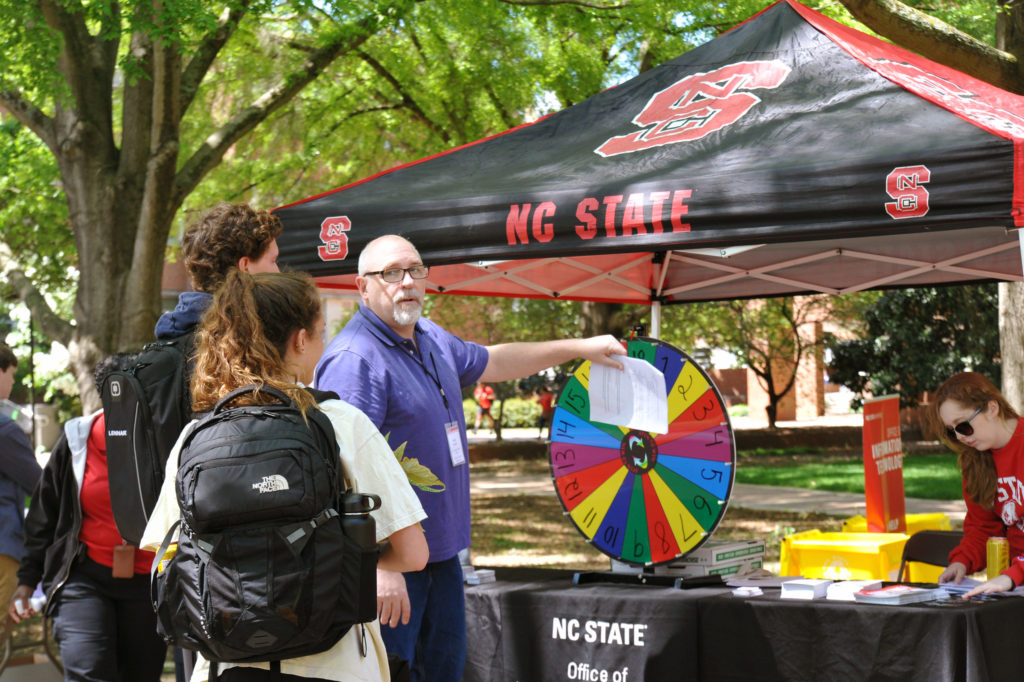
Subject matters! OIT staff kept busy this fiscal year educating the campus community about important matters, including how to identify accessibility barriers on campus during the Accessibility Excursion; how to avoid phishing attacks during Employee Appreciation Day and the Wolfpack Way of Life Wellness event; and how to recycle electronics during the NC State Earth Fair.
Extra hands! This past year, we got down and dirty to lift our community up! Staffers volunteered to sort frozen food products and dry goods with the Food Bank of Central & Eastern North Carolina and painted and installed doors, siding and roof shingles with Habitat for Humanity
Major Appointments
- Taylor Lundy was named assistant director of Business Services.
OIT Division Award for Excellence
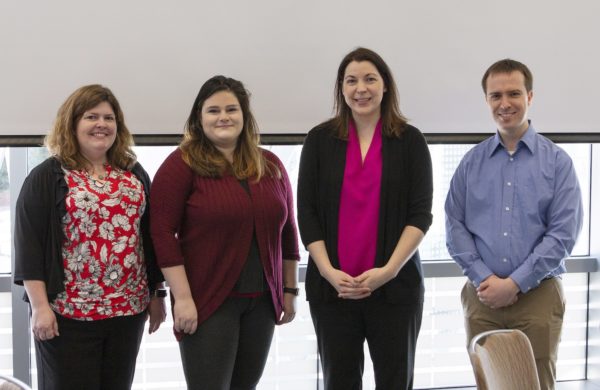
Picture of excellence! Recognized for their “meritorious accomplishments and contributions,” OIT Division Awards for Excellence winners, pictured from left to right, are Cheri Pipkin, Natalie Boone, Katie McInerney and Brian DeConinck.
The 2019 OIT Division Award for Excellence winners were Natalie Boone of Enterprise Application Services, Brian DeConinck of Outreach, Communications and Consulting, Katie McInerney of Outreach, Communications and Consulting, and Cheri Pipkin of Enterprise Application Services. All were recognized for their “meritorious accomplishments and contributions.” Sandra Carstens and Kerry Digou were also nominated for this award.
Pride of the WolfPack Award
2018-19 Pride of the WolfPack Award winners were Omara Brock, Elizabeth Cole-Walker, Miles Elliott, Lauren Etheridge, Louise Flinn, Rhonda Greene, Carol Hill, Chris Maxwell, Trish Palmer, Andy Raynor, and Lucy Tiefenthaler. The award honors staff members who make significant contributions to improving the services, systems and experiences of OIT, as well as the campus community.
T.O.A.S.T. Award
The 2018-19 recipients for the Totally Outstanding Attitude, Service and Talent Awards are: Dave Van Emden, Mykola Aleshchanov, Everette Allen, BJ Attarian, Derek Ballard, Andrew Behnke, Brandon Beasley, Rennie Bidgood, Danny Boemermann (2), Brandon Bouché (2), Omara Brock, Chris Maxwell, Leigha Bruce, Sherwood Bryan, Therese Burkhart, Tricia Cage, Antoine Carlet, Matthew Castles (2), Cameron Chauvaux, Cheryl Cleveland, Brice Clodfelter, Amy Coggins, Tony Copeland, Caffie Darden (3), Wade Davis, Chris Deaton, Julian Denton, Brian DeConinck (3), Mike Donathan, Chris Durgasingh, Robert Eisele, Kaleel Elliott, Miles Elliott (2), Lauren Etheridge, Darren Fallis, Louise Flinn (2), Mia Freeland, Reagan Grant, George Green, Rhonda Greene (2), Randy Greenly, Lee Hargis, Matt Heimbach, Marc Hoit, Tom Holden (2), Marie Hotaling, Krishnan Iyer, Bill Jenniches, Rick Johnson, Lisa Keel, Andrew Kotynski, Wenyi Li, Verna Little, Doug Little (2), Taylor Lundy, Richard Marshall, Stan North Martin, Jesse Mayo, Katie McInerney, Bill McKelvey (2), Jasmine McKoy, Yessy Mendoza-Tate, Kenzie Myers, Harry Nicholos, Megan O’Connor, Brian Ott, Needham Parks, Balaji Parthasarathy, Q Peiffer, Joseph Perry, Dan Perry, Cheri Pipkin, Lee Pipkin, Eric Poirier, Shivanjali Pothan, Maya Roy, Subhrodip Roy Chowdhury, Sydney Sample (2), Jirapat Sangvacharakul, Kerry Schroeder, Logan Skeehan (2), Joshua Snapp, Rich Soifer, Nilam Tailor, Dalton Teague, Lucy Tiefenthaler, Nico Tio (2), Michael Underwood, Tiffany Viator, Amanda White, Scott Wise, and Zach Zientek (2).
Service Awards
This fiscal year, NC State recognized 31 OIT employees who reached five-year milestones in their university service. They are:
5 Years of Service
- Avisek Choudhury
- Jessie Moore
- Gregory Paone
- Needham Parks
- Chris Porter
- Sharon Serpa
- Scott Steger
- Zachary Zientek
10 Years of Service
- Derek Ballard
- Damian Boyce
- Amy Coggins
- Alexander Fantroy
- Louise Flinn
- Daniel Frey
- Marc Hoit
- Daniel Sink
- Michael Underwood
15 Years of Service
- Peyton Armstrong
- Noah Genzel
- James Glover
- Joe Johnson
- Kristina Kelly
- Christopher Radabaugh
- Eric Sills
20 Years of Service
- Michael Gonzales
- Shawn Mclntosh
25 Years of Service
- Bill Coker
- Wade Cornett
- Wei Wang
30 Years of Service
- Dave Collins
- John Klein
Retired
OIT employees who retired during the 2018-19 fiscal year include: AnnMarie Casale, Alan Galloway, Rolf Grandstaff, Gail Gregory, Ollin Hunt, Donna Kerrigan, Gary Krynicki, Tim Lowman, Scott Moore, Katrina Robeck, Karen Tabron, and Peggy Watkins.
Professional Activities
- Damon Armour, Mardecia Bell, Deborah Booth, Elizabeth Cole-Walker, and Lavanya Sridharan are members of Information Systems Audit and Control Association (ISACA).
- Damon Armour, Mardecia Bell, Rennie Bidgood, Elizabeth Cole-Walker, and Andrew Kotynski are members of the Information Systems Security Association (ISSA). Cole-Walker also supports the ISSA career services board and Infosecon as a volunteer.
- Damon Armour, Deborah Booth, Andrew Kotynski, and Andy Raynor are members of the International Information System Security Consortium (ISC2).
- BJ Attarian became a certified instructor in Final Cut Pro X and DaVinci Resolve.
- Mardecia Bell, Elizabeth Cole-Walker and Andrew Kotynski are members of the FBI’s InfraGard.
- Mardecia Bell serves as a member of the UNC Information Security Council.
- Brandon Bouché became a certified broadcast engineer and certified video engineer via the Society of Broadcast Engineers.
- Elizabeth Cole-Walker is a member of the FBI RED DART/NCMS (formerly the National Classification Management Society).
- Bill Coker and Crystal Tenan presented the IT Purchase Compliance Process at the Association on Higher Education and Disability (AHEAD) state and national conferences.
- Brian DeConinck played a major role in facilitating the WPCampus-sponsored Accessibility Audit of the new WordPress Block Editor.
- Lauren Etheridge and Miles Elliott presented at the WPCampus Online conference. Jennifer McFarland and Brian DeConinck helped to facilitate and lead the conference.
- Pat Gaddy was elected chair-elect of the NC State University Staff Senate.
- Rhonda Greene served on the national Public Relations Society of America Technology Section Executive Board, completing her service as chair of the Scholarship and Fundraising Committee and continuing to serve as a member-at-large. She participates on the NC Chapter of PRSA Programming and Awards committees. She continues to serve as an alternate on the NC State University Staff Senate and participates on the senate’s Computer Loan Program Committee.
- Dan Grigg volunteers on the North Carolina Project Management Institute (NCPMI) communications team. He also co-chairs the Public Sector Community of Practice (CoP) to expand knowledge and support project management professionals in a public-sector focused forum.
- Dan Grigg recently co-facilitated two workshops on Emotional Intelligence in relation to project management for the NCPMI CoP and the newly formed NCPMI Global CoP.
- Dan Grigg is currently volunteering on the team that plans and facilitates the North Carolina Infragard Cybercamp, a week-long camp to help 30 STEM-focused high school students identify their future career path in science, technology, engineering, math, and cybersecurity.
- Jason Maners co-leads the EDUCAUSE Google G Suite community group.
- Stan North Martin co-leads the EDUCAUSE IT Communications Community Group, serves on the EDUCAUSE CG Leaders Advisory Committee and facilitated several sessions of the IT Communications Community Group at the national conference.
- Michelle Johnson presented “Implementing Fluid Student Self Service” at the 2018 Oracle Southeast Atlantic Regional User Group (SEARUG) Alliance Conference.
- Andrew Kotynski and Lavanya Sridharan are members of the Project Management Institute.
- Andrew Kotynski presented the ISC2 Safe & Secure Online curriculum to over 300 elementary and middle school students and parents and was co-chair of Wake Forest’s first STEM community event emphasizing Cybersecurity and Technology careers to local youth — with an emphasis on involving girls in the field. He is also the current chair of the Town of Wake Forest Technical Advisory Board.
- Jennifer McFarland co-chairs the Diversity and Inclusion Community Group within the WPCampus higher education organization.
- Jennifer McFarland and Brian DeConinck served as volunteer co-chairs and presented at the WPCampus 2018 conference. Both are providing leadership for the upcoming 2019 conference.
- Louise Flinn and Sarah Noell presented at the EDUCAUSE Security Professionals Conference.
- Crystal Tenan completed the year-long Equal Opportunity Institute sponsored by the Office for Institutional Equity and Diversity.
- Connie Reitfort, Eric Poirier and Balaji Parthasarathy presented “OnBase Transcript Capture at NCSU” at the OnBase Higher Education VOGUE Conference.
- Lavanya Sridharan coordinated with Distance Education and Learning Technology Applications (DELTA) and presented on project management in the IT Community event.
- Dan Grigg and Stan North Martin serve on NC State’s National Coalition Building Institute team, co-facilitating workshops on diversity and inclusion.
- Rich Soifer and Shawn Caton presented “Using Activity Guide for Job Actions” at the 2018 Oracle SEARUG Alliance Conference.
- Crystal Tenan presented at several conferences and association meetings, including Accessing Higher Ground, NC Independent Colleges and Universities, and NC AHEAD.
- OIT Staff were heavily involved in UNC CAUSE:
- Sarah Noell and Jennifer McFarland served on the executive board, with McFarland serving as 2018 conference program chair and Noell as president.
- Harry Nicholos co-lead the vendor committee.
- Miles Elliott coordinates the WordPress Special Interest Group.
- Everette Allen co-chairs the Apple Managers Special Interest Group.
- Jason Maners co-chairs the G Suite for Education Special Interest Group.
- Everette Allen, BJ Attarian, Chris Deaton, Brian DeConinck, Miles Elliott, Lauren Etheridge, Louise Flinn, Jason Maners, Stan North Martin, Jennifer McFarland, Sarah Noell, Crystal Tenan, Michael Underwood, Susan West, and others presented sessions.
- OCC staff hosted weekly co-working days for campus developers and web designers. They also coordinated 10 presentations throughout the year for the developer community.
- The ServiceNow team is hosting regular ServiceNow Open Sessions for developers and power users. These sessions are scheduled monthly during the fall and spring semesters.
- Kevin Ficker in ClassTech earned his certification as a AVIXA certified technology Specialist in November 2018.
- Brennan Watson in ClassTech earned Crestron’s Master Technology Architect certification in April 2019.
- Rennie Bidgood earned a GIAC Information Security Fundamentals (GISF) certification.
- A number of OIT staff have earned the Information Technology Infrastructure Library (ITIL) certifications over the past year:
- ITIL Expert Certification: David Ladrie and Susan West
- ITIL Service Design: John Constantelos, Danny Davis, Nik Davlantis, and Dan Evans
- ITIL Service Strategy: Ron Bradley, Danny Davis and Nik Davlantis
- ITIL Foundations: Damon Armour, David DeFoor, Andrew Kotynski, Chanél Ware, and Sarah Ward
- Ron Bradley advised a Senior Design Team in the College of Engineering.
- ClassTech continues to play a major role in the success of the Classroom Summit, a statewide conference for AV and instructional technology professionals.
- Peyton Armstrong completed his Jamf Certified Admin certification.
Staff Diversity
With a workforce of 204 men and 87 women ranging in age from their 20s to 80s, our staff brings unique value and perspective that can only yield innovative technology.
OIT is launching an initiative to be more intentional in its efforts to promote diversity, equity and inclusion. This has included Marc Hoit’s signature on EDUCAUSE’s CIO statement, which commits the undersigned chief information officers to promote a more diverse and inclusive workplace to foster more effective and creative teams of IT professionals.
OIT’s current workforce consists of 203 men and 92 women ranging in age from their 20s to 80s. See related charts regarding our work culture:
| IT Staff | FY 2018-19 | FY 2017-18 |
|---|---|---|
| African American | 36 | 34 |
| American Indian | 3 | 4 |
| Asian | 24 | 24 |
| Hispanic | 6 | 8 |
| White | 205 | 221 |
| No report | 20 | 0 |
| Total | 295 | 291 |
| OIT Staff Age Group | Number of Employees | Percentage of Workforce |
|---|---|---|
| 20s | 17 | 5.8% |
| 30s | 51 | 17.3% |
| 40s | 98 | 33.2% |
| 50s | 97 | 32.9% |
| 60s | 28 | 9.5% |
| 70s | 3 | 1.0% |
| 80s | 1 | 0.3% |
Photo Credit: Header photo of Prague by Dan Evans




